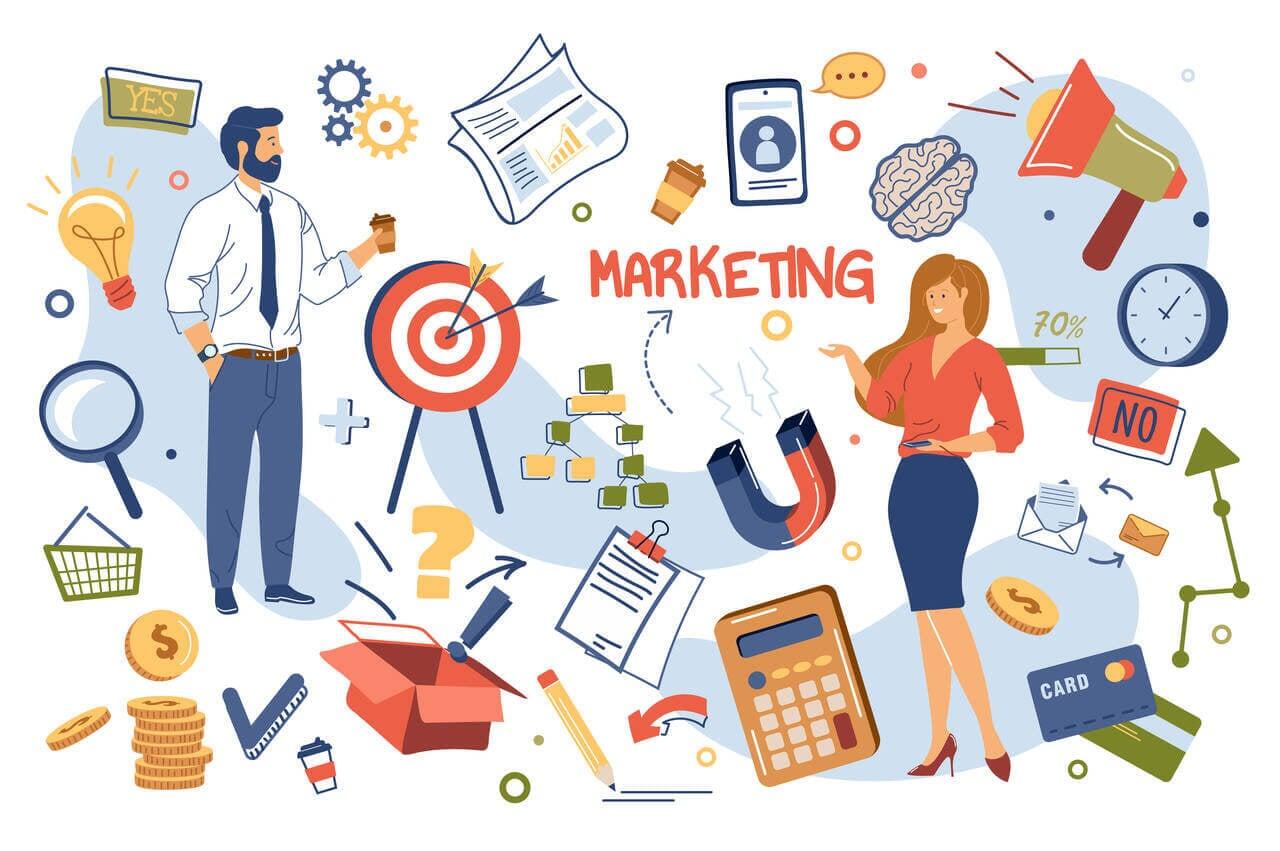
Defining your content may sometimes seem like a simple task, but it is more than just another facet of digital marketing. Content marketing, content strategy, content creation, and marketing strategy are not the same. Remember that content is only part of a much larger picture of digital marketing. Without a content strategy, you could end up with content creation taking place in a vacuum, which often leaves us with a misunderstanding of what content marketing is. Review your blog posts, resources, manuals, etc., and think of content as a whole, not just as a part of your marketing strategy.
Content strategy and content marketing are two very different concepts; however, they fit together perfectly. Once you understand the differences of these often interchangeable terms, it’s time to start creating content and develop the content strategies you need to achieve your goals with an effective content marketing campaign.
Content Strategy Vs. Content Marketing:
Content Strategy Vs. Content Marketing:
Simply put, content strategy is a guideline for everything you create, and content marketing involves the methods for what you do with it. While content strategies and content marketing overlap, it is important for brands to use these two to create content that serves the user well while appeasing the gods of Search Engine Results Page (SERP). Therefore, content strategy complements content marketing in terms of content creation, and developing and implementing marketing strategies, and vice versa. You need both content marketing and content strategy to succeed, and they will, of course, overlap.
Content marketing is essential for businesses, but without the right strategy, you are wasting valuable time that will only earn you a mediocre ROI. If you use a content strategy as the foundation and blueprint for your content marketing efforts, you will see amazing results. With content strategies, there is no journey with a fixed goal, and every piece of content you create will be a well-carved piece of the puzzle that helps you design the story and message of your brand.
Content Marketing
Content Marketing
Content marketing involves a variety of content that can be published online, such as videos, blogs, podcasts, articles, books, videos, and more. You can also post long form and short form content and post your content on your website and share it on social media sites to increase your online visibility. Everything that you choose to publish should have a specified goal and the right means to reach that goal. That’s where content marketing strategy comes in. It helps you determine the best marketing channels that can support your goal and implement it accordingly.
For example, if the goal is to generate leads, your content should revolve around the same topic. It should serve as a magnet – a lead magnet that can help increase your reach. That’s how you can achieve your next goal – getting clicks. You can also send promotional emails and email newsletters to get more clicks by driving traffic to your website, or write blog posts for your customers and audiences and then send another email when you get a click.

In a world where people pay money just to escape ads, content marketing allows you to connect organically with potential customers. It may take a lot of work, but it is a relatively straightforward concept, especially for small businesses with limited budgets and resources.
Content Strategy
Content Strategy
Content Strategy involves ideation and research that flows into the establishment of an effective content marketing campaign. It guides and fuels content marketing. Effective content marketing can improve your strategy and help produce better results. Without a content strategy, the content on your site will not be user-friendly and will not be helpful to your readers, nor will it be relevant to them. Content Strategy is a deep insight into the needs and goals of your brand, and it’s about finding out what kind of content you need, where to promote it, and what should be the timeline for creation and publication.

Why You Need Content Marketing and Content Strategy
Why You Need Content Marketing and Content Strategy
How are content marketing and content strategy the same, and how are they different? Content marketing alone is not enough to increase your chances of getting leads or increase your rankings in search results and stay in line with the brand, but it makes up a significant part of it. A strategy is needed to capture your voice and release content at the ideal time. If you have prepared an effective strategy that works well and completes targets, no piece you ever create will be a random one.
One of the most noticeable aspects of content strategy is knowing your target audience. Once you know who your audience is, you will be able to know exactly what they want, when they want them and how they want it to be delivered. This way, you can measure its success. Content marketing alone is not sufficient enough to build a strong brand or generate a high ROI. You need a strategy for content to ensure that. Let’s look at some of the key elements that should make up a content strategy and tips for implementing an effective one.

Content Creation and Ideation
Content Creation and Ideation
Content marketers need to think about why they create content, what policies they follow, when they are created, who creates them, how much time is required for content generation and updates, and what KPIs (metrics) they are judged against. Here are the simple steps for planning your content:
- Monitor your content and let your team keep an eye on it so you can track performance and make improvements. Take note of your successes and always have them ready to be referenced by your team for ideation.
- Evaluate your overall marketing goals and assess how you can inform your audience better.
- Address customer pain points as well as other broader issues beyond the brand.
- Explain your product or service, break down your company’s point of sale and get a deep understanding of who your target audience is. If you do not proceed with substantive reasons until you know why you are doing it, skip this step because the rest of the process depends on it.
Target Audience and Reach
Target Audience and Reach
Identifying who your audience is and understanding them helps you identify what you should write or offer them. You’ll know what they want to hear if you know who you are talking to, you can deliver more effective messages, and establish better customer relationships. Your content strategy can be taking note of customer pain points and communicating solutions to them. What are their biggest pain points? Why should they read content, and how can your products and services help improve their life?

Do your research. Collect information regarding the various aspects of the project and know where it is targeted at. Creating a customer persona can also help you determine your target audience. The content persona you create should guide you on what content you should be writing. When your audience reads your content, they are in a state of consciousness and reflecting on making a decision in whatever they may be interested in or looking to purchase from you. The best way to help them convert is to respond to the potential buyer as if they are not a buyer and that you are not a seller. Treat them like a customer and help them understand your product or service or what value you are offering to see if it matches their needs and interests.
Content Production
Content Production
You may have to work long nights to write great content, or you could build up a team internally, hire freelancers or contractors, and even content strategists to help you out. Experts can create content on any topic with authority; however, remember that it is always good to know when to create content and understand why you are creating it. It is crucial that you give weight to these aspects of your business as they can be significant drivers toward business success.
Content Performance
Content Performance
Check your own website’s historical traffic, use tools like Google Trends to track cycles and seasons, and consider when your competitors typically publish their content. In many situations, the best option is to create a content calendar that outlines your content strategy for the day, week, month, or even the whole year.

Every piece of content is crucial in the creation process, but it should feel coherent. The content published on your website should look and feel cohesive and relevant - not only in terms of the content itself but also in the context of your content strategy. This cohesion builds trust with readers and improves the engagement of users and the authority of a website.

Consistency
Consistency
Consistent and intelligent content improves your SEO ranking. You need to perform ongoing audits and revisions to keep the content fresh and relevant. Monitor your performance and respond to customers and solve issues if necessary. SEO is getting trickier; it’s time you define and outline your content strategy. Note that you need to build a maintenance plan around it that takes into account continuous performance adjustments and measurable KPIs.
Adaptability
Adaptability
Content is not a static concept. There is a need to adapt to the market and own your successes and failures. It’s not just about the content itself; it’s also about strategy and sustainability.
Optimization
Optimization
Optimization is the key element of content creation and one of the most important elements of any content strategy. Your content marketing efforts may or may not be successful, but make sure the content in place is. A good content marketing strategy means using high-quality content on your website to reach your audience and potential customers, and increase leads.
Content Strategy Consulting
Content Strategy Consulting
If you own a small business and are just starting out, you have to create a few pieces of content and market them to your targeted audience. As the process moves along, you can create a budget that caters to your needs and produce high-quality, SEO-optimized content. You can also hire experts to keep it going. They can help you set up a content calendar. A content strategist or a strategy consultant can also be beneficial for your business because they can map out a bespoke plan for you and build a strategy that works best for your business. They can help you set up your goals, analyze your progress accordingly, see how well the content you are posting is doing and develop a content strategy based on proper statistical figures. Those figures will determine the success of your business. These factors include the quality of content, the extent of participation, and the number of views, clicks, and retransmissions. Contact us at Universal Creative Solutions for a consultation.

